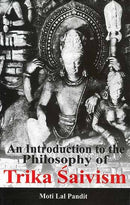The aim of this book is basically to introduce the reader to the fundamental principles that Trika Philosophers have enunciated in their philosophical-cum-theological treatises. Such an approach has been adopted deliberately on account of the fact that Trika system of thought, which is very rich in philosophical vocabulary, is hardly known to general public in the manner of Advaita Vedanta of Samkara. Although non-dualistic in orientation, yet it differs radically from the monism of Samkara with regard to the nature of the Absolute and the world. The Trika philosophy rejects the Vedantic view of the Absolute theistically, and so speaks of Paramasiva as being both consciousness and reflective awareness. As such the Absolute freedom, and so the school also is referred to as being that of Freedom. Insofar as the status of the world is concerned, the Trika thinks of it as being extension/emission/reflection of Paramasiva and so is considered to be real. It means that the world, even though a reflection of Paramasiva, is actually Siva itself.
From these main differences it can be discerned that the Trika absolutism is radically different from the one that Samkara has adumbrated. It is hoped that the reader upon reading the book will be able to have the grasp of the main philosophical principles that the Trika has enunciated and developed.
Moti Lal Pandit, trained as a theologian and linguist, has been engaged for last three decades in such dialogic research as would disseminate knowledge concerning the essence of such forms of spirituality as has been enunciated by such major religions as Hinduism, Buddhism and Christianity. The result of this untiring effort has been the publication of such books as, for example, Vedic Hinduism; Philosophy of the Upanisads; Samkara's Concept of Reality; Being as Becoming; Beyond the Word; Transcendence and Negation; Buddhism: A Religion of Salvation; The Trika Saivism of Kashmir; Encounter with Buddhism; and The Disclosure of Being.
Description
The aim of this book is basically to introduce the reader to the fundamental principles that Trika Philosophers have enunciated in their philosophical-cum-theological treatises. Such an approach has been adopted deliberately on account of the fact that Trika system of thought, which is very rich in philosophical vocabulary, is hardly known to general public in the manner of Advaita Vedanta of Samkara. Although non-dualistic in orientation, yet it differs radically from the monism of Samkara with regard to the nature of the Absolute and the world. The Trika philosophy rejects the Vedantic view of the Absolute theistically, and so speaks of Paramasiva as being both consciousness and reflective awareness. As such the Absolute freedom, and so the school also is referred to as being that of Freedom. Insofar as the status of the world is concerned, the Trika thinks of it as being extension/emission/reflection of Paramasiva and so is considered to be real. It means that the world, even though a reflection of Paramasiva, is actually Siva itself.
From these main differences it can be discerned that the Trika absolutism is radically different from the one that Samkara has adumbrated. It is hoped that the reader upon reading the book will be able to have the grasp of the main philosophical principles that the Trika has enunciated and developed.
Moti Lal Pandit, trained as a theologian and linguist, has been engaged for last three decades in such dialogic research as would disseminate knowledge concerning the essence of such forms of spirituality as has been enunciated by such major religions as Hinduism, Buddhism and Christianity. The result of this untiring effort has been the publication of such books as, for example, Vedic Hinduism; Philosophy of the Upanisads; Samkara's Concept of Reality; Being as Becoming; Beyond the Word; Transcendence and Negation; Buddhism: A Religion of Salvation; The Trika Saivism of Kashmir; Encounter with Buddhism; and The Disclosure of Being.
Payment & Security
Your payment information is processed securely. We do not store credit card details nor have access to your credit card information.


